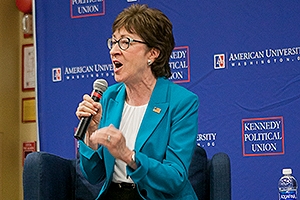Government & Politics
Susan Collins Speaks at AU

In an institution often fraught with partisanship and dysfunction, Sen. Susan Collins, R-Maine, is a voice of reason and moderation. With a voting record hovering around the ideological center of the Senate, Collins tries to forge alliances and build consensus. She’s also become a “Cal Ripken of the Senate,” as she’s never missed a vote since getting elected in 1996.
Last week, Collins appeared at American University in Mary Graydon Center. She talked about gender politics, public service, gun control, and—of course—the struggle to end partisan gridlock.
The AU College Republicans co-sponsored the Kennedy Political Union event. School of Public Affairs Professor Jennifer Lawless moderated the discussion.
At the outset, College Republicans President Tom Hebert praised KPU for bringing Collins to campus. “As a conservative, it is not lost on me that KPU’s first event of the year features the most senior ranking Republican woman in the United States Senate,” he said. KPU leaders “are clearly committed to promoting intellectual diversity on this campus.”
Overcoming Partisanship
Early on, she talked about the public’s lack of faith in Congress. “One poll showed that Congress’ approval rating among the American people is in the single digits,” she said. “Congress ranked below colonoscopies and root canals. And at least with those, you do get an anesthetic.”
She also posed a thought-provoking question for the audience: Is congressional partisanship dividing the country, or are leaders reflecting the polarized electorate?
Collins discussed “residential sorting,” as conservatives are consolidating in rural areas and outer suburbs and liberals are living in urban centers and inner suburbs. Along with gerrymandering, geographical distance creates political bifurcation.
“We are isolating ourselves from those who aren’t just like ourselves,” she said. “It seems that we need to revise the old saying that familiarity breeds contempt. As the evidence mounts that it is the lack of familiarity that is the real culprit.”
Her message of comity can be met with resistance, she acknowledged. In an earlier speech she gave on this subject, some people missed the point entirely.
“I was talking about civility, and that was the whole subject of my speech. Well, the next day I made the mistake of going online and looking at the comments that were attached to the newspaper article reporting on my speech,” she recalled. “The first comment was that I was a traitor. The second comment was that I was a RINO [Republican In Name Only]. And it went downhill from there. And I kept thinking, ‘these people have no sense of irony. I gave a speech on civility.’”
Gun Control and the Lack of Consensus
As a case study in gridlock, she noted how difficult it’s been to pass gun control laws. In the aftermath of the Orlando nightclub massacre, Senate leaders scheduled two votes, on two partisan proposals. Every single senator knew these would fail, she recounted. The measures were similar to ones introduced after previous mass shootings, and yet again, they were defeated.
Collins and some of her colleagues decided to take stronger action. “I felt like I was living in Groundhog Day, where the same thing kept happening over and over again, with the same results,” she said.
They drafted a bipartisan compromise based on a simple premise: “If you’re too dangerous to get on an airplane, you’re too dangerous to buy a gun,” she explained.
The bill got a majority, but couldn’t muster the 60 votes to break a filibuster. It’s still in congressional limbo. “Each mass killing seems like a recurring nightmare. And each failure by Congress to address this crisis is a replay of the hyperpartisanship that prevents progress.”
In response to one of her earlier gun control efforts, a group ran TV attack ads about her in Maine. “In this ad, I—a female Caucasian—morphed into Barack Obama. Now, I thought that was a pretty good trick,” she joked. She later showed the ad to President Obama at a White House event. “To which he replied, ‘you know, your hair style’s not bad on me.'”
Crashing the Old Boys’ Club
During the question-and-answer session, Lawless asked her about being a woman in a male-dominated institution like the Senate. Drawing on her own research, Lawless said that women are less likely to run for office in the first place.
“We women, at times, are our own worst enemy when it comes to running for office, because we just don’t have enough confidence in our ability,” said Collins.
Collins noted that there are a record 20 women who are now U.S. senators, and they all gather for monthly dinners. She relayed a humorous story about a senior male senator asking her about these dinners. “He said, ‘well, what do you talk about?’ And I just smiled sweetly and I said, ‘we’re planning the coup,’” she said to laughter.
Collins insisted that these kinds of activities help promote bipartisanship between GOP and Democratic female colleagues.
In Your Hands
At various points in the evening, Collins challenged the student audience to find common ground with each other. She conveyed how and why the Millennial generation should get involved in the political process.
“Our country is in your hands. It’s going to be up to your generation to straighten out the problems caused by my generation. And I’m counting on you to do it,” she said. “There is nothing like the feeling of helping to write a law that rights a wrong.”
